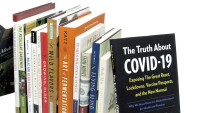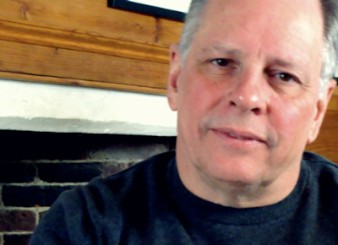firstwriter.com's database of publishers includes details of 2,782 English language publishers that don't charge authors any fees for publishing their books. The database is continually updated: there have been 27 listings added or updated in the last month. With over a dozen different ways to narrow your search you can find the right publisher for your book, fast.
News

The number of UK audiobook downloads increased by 17% between 2022 and 2023, according to new data from the Publishers Association (PA).
Revenue from audiobooks rose 24% across the same period to £206m in 2023, reflecting an increase in the number of audiobook downloads from 50m to 59m, the trade body said.
Over five years, UK audiobook revenue has more than doubled. “It’s fair to say that audio is now a really serious part of the publishing portfolio,” said the PA’s chief executive, Dan Conway. “Audiobooks have established themselves as a major route to market for consumers of books in this country”.
These figures reflect the way the audiobook market has evolved. Spotify made audiobooks available to its Premium subscribers in October, while Audible has expanded from single-narrator audiobooks to those with large, starry casts and sound effects. Sam Mendes-produced audiobooks of David Copperfield and Oliver Twist featuring Ncuti Gatwa, Helena Bonham Carter and Nicola Coughlan were released in the past two years, and there are plans to release new audiobooks of all seven Harry Potter titles, voiced by a cast of more than 100 performers.

Rizzoli International Publications, the New York City-based subsidiary of Italian publishing house Mondadori Group, will acquire Chelsea Green Publishing, the 40-year-old White River Junction company known for its titles on the politics and practice of sustainable living.
Mondadori announced on April 15 that Rizzoli will pay $5 million for the Vermont company and its London subsidiary, Chelsea Green Publishing UK Ltd. The deal is expected to close by June 30.
"This partnership aligns perfectly with our vision of promoting meaningful content that resonates with global audiences while addressing crucial issues related to sustainability and eco-friendly living," Rizzoli's CEO and president Stefano Peccatori said. Rizzoli International publishes illustrated books about fashion, interior design, art, architecture, photography, travel, sports and food. The company began in 1964 as a New York City bookstore, which still operates.

On the heels of Simon & Schuster's recent revival of Summit Books, headed up by former Little, Brown editor-in-chief Judy Clain, Simon & Schuster UK has announced it will relaunch the imprint in the U.K., tapping Picador editor-in-chief Ravi Mirchandani as publisher.
Mirchandani has helmed Picador in the U.K. since 2019, and has spent the past decade at the Pan Macmillan imprint. There, his authors include Patrick Radden Keefe, Douglas Stuart, and Hanya Yanagihara. His publishing career has spanned nearly 40 years, and prior to Picador, he served as editor-in-chief of Atlantic Books, publishing director of William Heinemann, and editorial director at Penguin Books. At Summit Books UK, Mirchandani will report to Suzanne Baboneau, managing director of Simon & Schuster UK’s adult publishing division, effective September 2.

A notable shift towards shorter children’s books is being reported by publishers, agents and librarians, with many welcoming what they see as a challenge to the idea of length as “a marker of merit”, particularly in relation to middle-grade titles. The development is also seen as a way of getting reluctant readers “back into reading” following the pandemic and its impact on comprehension and enjoyment levels.
Discussions at the Bologna Children’s Book Fair around declining reading levels, exacerbated by the pandemic, were accompanied by discussions about book length, difficulty level, and what some see as “unrealistic expectations” around middle-grade titles. One attendee told the Bookseller that “there is a real feeling that books are too long and need to be shortened as attention spans and comprehension decline".
Articles

I've fallen in love with printed books. Again. Especially those for children.
Twenty years into my book publishing career—which included marketing for trade book publishers and founding a children's imprint—I had the opportunity to go digital, move into the future, hang out with the cool guys, play games, do the bicoastal thing, and grow a ponytail.
When Simon & Schuster announced in late February that it is canceling Milo Yiannopoulos’s book, Dangerous, many in the publishing industry reacted with a sigh of relief. The six-figure book deal that the right-wing provocateur landed at Threshold Editions, S&S’s conservative imprint, late last year caused a wave of criticism—from various factions of the media, the public, and the house’s own authors. And, though it’s still unclear what ultimately motivated the publisher to yank the book, the fervor that the alt-right bad boy’s deal caused put some on alert. Could other publishers be pressured into canceling books by controversial conservatives? Does the industry have a double standard for authors on the right? Does it matter?

Traditional book publishers. They were once known as the titans of the book publishing industry. In the Baby Boomer era, self-publishing was an unknown concept. You needed a traditional publisher if you wanted the best chance to succeed with your book.
During that time, there was significantly less competition for publishers and authors, meaning more book sales for both parties.
Over time, traditional publishers (especially The Big 5) gradually started to exploit authors by offering lower royalties and seizing the author’s publishing rights.
Signing a contract with even a brand-name traditional book publisher initially feels like a ticket to Nirvana. You may expect, for example, your new publisher to set you up with a big fat advance, a multi-city promotional tour, your very own personal PR rep and multiple copies of your book on every bookshelf in the nation (and Canada) for as long as you and your book shall live.
But to understand how book publishers really work, study this list of what I call the four great “myths” of traditional book publishing. Then, by all means, proceed to seek out a publisher if that’s your goal but do so with your eyes wide open. Your relationship with your publisher will run much smoother if you recognize its pitfalls as well as its glories.
Submit a listing
If you run, are involved in, or just know of a publisher not included in our publishers database, you can suggest a new listing by clicking here. You can also use this form for suggesting amendments to existing listings.
To view our inclusion policy, click here.





